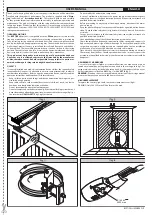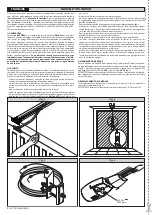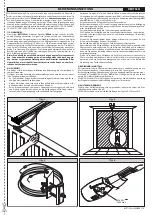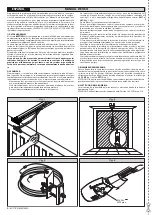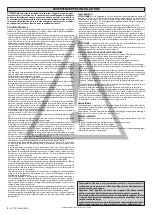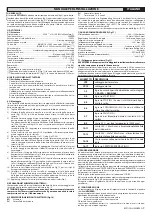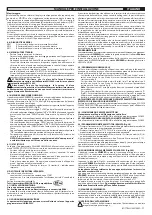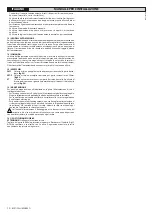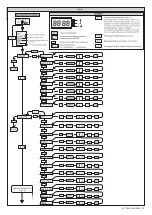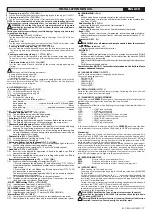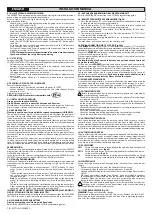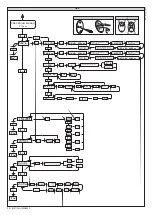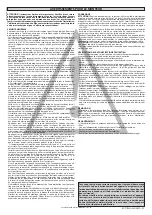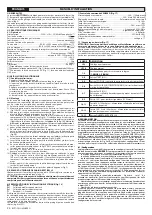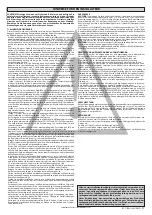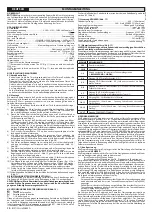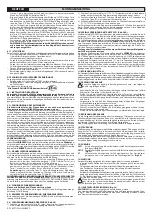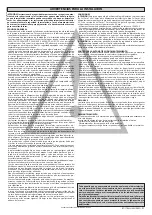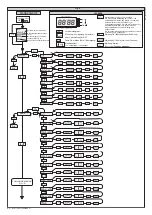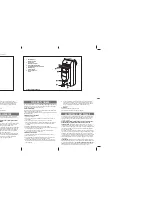
INSTALLATION MANUAL
ENGLISH
- Opening torque (
Op.Torque
) [ 50% ]
Set the numerical value of the motor’s opening torque in the range 1% to 99%.
- Closing torque (
Cls.Torque
) [ 50% ]
Set the numerical value of the motor’s closing torque in the range 1% to 99%.
NOTE: In case of obstacle detection, the Ampere-stop function halts the
leaf movement, reverses the motion for 1 sec. and stays in the STOP state.
WARNING: Check that the force of impact measured at the points
provided for by standard EN 12445 is lower than the value laid down
by standard EN 12453.
Setting sensitivity incorrectly can result in damage to property and injury
to people and animals.
- Partial opening (
part.open
) [ 1.0 m ]
Set the numerical value of partial opening in the range 10 cm (0.001) to 6 m
(006.0)
- Zone (
Zone
) [ 0 ]
Set the zone number between a minimum value of 0 and a maximum value
of 127. See section 11 entitled “Serial connection”.
- Running speed during opening (
op speed
) [99%]
Sets the maximum opening speed reached by the actuator at running speed.
The value is given as a percentage of the maximum speed the actuator can
reach.
- Running speed during closing (
cl speed
) [99%]
Sets the maximum closing speed reached by the actuator at running speed.
The value is given as a percentage of the maximum speed the actuator can
reach.
- Slow-down distance (
dist.sloud
) [007]
Sets the slow-down distance travelled by the actuator during opening and
closing.
The value is given in centimetres.
Editing one of the following parameters:
- Running speed during opening
- Running speed during closing
- Slow-down distance
results in the actuator performing a complete opening/closing cycle with the
anti-crush feature switched off. The “SET” message flashes on the display to
warn that this cycle is in progress.
8.3) LOGIC MENU (
LOGIC
)
- Automatic Closing Time (
TCA
) [ OFF ]
ON: Switches automatic closing on
OFF: Switches automatic closing off
- 3 Step (3 Step) [OFF]
ON: Switches to 3-step logic.
A start pulse has the following effects:
door closed:...........................................................................................................opens
during opening:..............................stops and switches on TCA (if configured)
door open:..............................................................................................................closes
during closing:.....................................................stops and movement is reversed
after stop: ................................................................................................................opens
OFF: Switches off 3-step logic.
- Block opening pulses (
ibl open
) [ OFF ]
ON: The start pulse has no effect during opening.
OFF: The start pulse has effect during opening.
- Pre-alarm (
pre-alarm
) [ OFF ]
ON: The flashing light comes on approx. 3 seconds before the motor starts.
OFF: The flashing light comes on at the same time as the motors start.
- Photocells during opening (
Photoc.open
) [ OFF ]
ON: when beam is broken, operation of the photocell is switched off during
opening. During closing, movement is reversed immediately.
OFF: when beam is broken, photocells are active during both opening and
closing. When beam is broken during closing, movement is reversed only
once the photocell is cleared.
- Photocell test (
test phot
) [ OFF ]
ON: Switches photocell testing on (see fig. 17A)
OFF: Switches photocell testing off
- Gate open light or 2nd radio channel (
SCA 2Ch
) [ ON ]
ON: The output between terminals 14-15 is set as Gate open light: in this case,
the 2nd radio channel controls partial opening.
OFF: The output between terminals 14-15 is set as 2nd radio channel.
- Fixed Code (
fixed code
) [ OFF ]
ON: Receiver is configured for operation in fixed-code mode, see “Radio
transmitter cloning” section.
OFF: Receiver is configured for operation in rolling-code mode, see “Radio
transmitter cloning” section.
- Remote control programming (
radio prog
) [ ON ]
ON: Enables wireless memorizing of transmitters (Fig.20):
1- Press in sequence the hidden key (P1) and normal key (T1-T2-T3-T4) of
a transmitter that has already been memorized in standard mode via the
radio menu.
2- Press within 10 sec. the hidden key (P1) and normal key (T1-T2-T3-T4)
of a transmitter to be memorized.
The receiver exits programming mode after 10 sec.: you can use this time
to enter other new transmitters.
This mode does not require access to the control panel.
OFF: Disables wireless memorizing of transmitters. Transmitters are memo-
rized only using the relevant Radio menu.
- START - OPEN setting (
start-open
) [ OFF ]
ON: Input between terminals 3-4 works as OPEN.
OFF: Input between terminals 3-4 works as START.
- PED-CLOSE setting (
ped-close
) [ OFF ]
ON: Input between terminals 16-17 works as CLOSE.
OFF: Input between terminals 16-17 works as PARTIAL OPENING.
- Master/Slave (
master
) [ OFF ]
ON: Control panel is set up as the Master unit in a centralized connection system.
OFF: Control panel is set up as a Slave unit in a centralized connection system.
8.4) RADIO MENU (
RADIO
)
- Add
Used to add a key on a remote control to the receiver’s memory.
Once memorized, it returns the number of the receiver in the memory loca-
tion (from 01 to 64).
- Add Start Key (
Add start
)
associates the desired key with the Start command
- Add 2ch Key (
Add 2ch
)
associates the desired key with the 2nd radio channel command
- Read (
Read
)
Checks a key of a receiver and, if memorized, returns the number of the re-
ceiver in the memory location (from 01 to 64) and number of the key (T1-T2-
T3 or T4).
- Erase List (
erase 64
)
WARNING! Erases all memorized remote controls from the receiver’s
memory.
- Read receiver code (
cod RX
)
Displays the code entered in the receiver.
- W LINK (
uk
)
ON =
Enables remote programming of cards via a previously memorized W LINK
remote control. It remains enabled for 3 minutes from the time the W LINK
remote control is last pressed.
Refer to the W LINK remote control’s manual for the mapping of the relevant keys.
OFF =
W LINK programming disabled.
Consult sections 8/9/10/11 for further information on the built-in Clonix
receiver’s advanced features.
8.5) LANGUAGE MENU (
LANGUAGE
)
Used to set the programmer’s language on the display.
There are 5 language options:
- ITALIAN (
ITA
)
- FRENCH (
FRA
)
- GERMAN (
DEU
)
- ENGLISH (
ENG
)
- SPANISH (
ESP
)
8.6) DEFAULT MENU (
DEFAULT
)
Restores the controller’s default factory settings. Following this reset, you will
need to run the autoset function again.
8.7) DIAGNOSTICS AND MONITORING
The display on the VENERE D panel gives a certain amount of useful information
both during normal operation and when faults are detected.
Diagnostics:
In the event of malfunctions, the display gives a message showing which device
needs checking:
STRT
= START input activated
STOP
= STOP input activated
PHOT
= PHOT input activated
SWO
= OPENING LIMIT SWITCH input activated
SWC
= CLOSING LIMIT SWITCH input activated
PED
= PEDESTRIAN input activated
OPEN
= OPEN input activated
CLS
= CLOSE input activated
In the event the door encounters an obstacle, the VENERE D panel stops the door
and commands it to reverse, while on the display the “AMP” message appears
Monitoring:
During opening and closing, the display shows four numbers separated by a
decimal point, e.g.
35.40
. The numbers are updated constantly during the door’s
operation and stand for the instantaneous torque reached by motor 1 (
35
) and
torque threshold (opening, closing, slow-down) set in the parameters menu (
40
).
Via these values, we can correct the torque setting.
If the value of the instantaneous torque reached during the door’s operation gets
rather close to the threshold value set in the parameters menu, malfunctioning
may occur in the future due to wear or the door becoming slightly misshapen.
Consequently, it is advisable to check the maximum torque reached during a
number of cycles at the installation stage and, where necessary, set a value ap-
prox. 5/10 percentage points higher in the parameters menu.
8.8) ERROR DIAGNOSTICS:
ER01
Error in safety device (photocell) test
ER10
Problems detected in motor’s control circuit
ER11
Problems detected in motor’s current reading circuit
8.9) AUTOSET MENU
Move the door to the closed position
• Launch an autoset operation by going to the relevant menu on the VENERE
D panel (Fig.B).
• As soon as you press the OK button, the “........ ....” message is displayed and the
control unit commands the door to perform a full cycle (opening followed
by closing), during which the minimum torque value required for the door
to move is set automatically.
During this stage, it is important to avoid breaking the photocells’ beams and
not to use the START and STOP commands or the display.
Once this operation is complete, the control unit will have automatically set
the optimum torque values. Check them and, where necessary, edit them as
described in the programming section.
WARNING: Check that the force of impact measured at the points
provided for by standard EN 12445 is lower than the value laid down
by standard EN 12453.
Warning!! While the autoset function is running, the obstacle detection
function is not active. Consequently, the installer must
BOTTICELLI VENERE D -
17
D811493 00100_02
Summary of Contents for Botticelli VENERE D
Page 14: ...o vk 14 BOTTICELLI VENERE D D811493 00100_02...
Page 51: ...BOTTICELLI VENERE D 51 D811493 00100_02...
Page 52: ......

